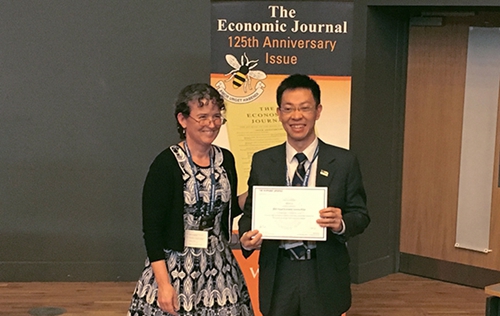Professor Yu Miaoji wins Royal Economic Society Prize
May 23, 2016
Peking University, May 23: On the 2016 Annual Conference of the Royal Economic Society held at University of Sussex, UK, Professor Yu Miaojie from PKU National School of Development was awarded Royal Economic Society Prize.
Introduced in 1990, the Royal Economic Society Prize is awarded to the author of the best paper published in The Economic Journal. Since 1996, the prize has been awarded annually. In the past 25 years, a number of outstanding American economists, winners of John Bates Clark Medal and Nobel laureates have won the prize. It is universally acknowledged to be the most important European prize in economics after Nobel Prize in Economics.
The Economic Journal is one of the world’s most renowned economic journals with a history of 125 years. It is recognized as one of the global top journals in economics. The most famous economist in the 20th century Sir John Maynard Kenyes had been the editor of the Economic Journal for more than 30 years.
Professor Yu Miaojie won the Royal Economic Society Prize with his independent article “Processing Trade, Tariff Reductions and Firm Productivity: Evidence from Chinese Firms”. Yu has become the first winner from mainland China, and the first solo winner of Chinese descent, of the prize.
The Royal Economic Society Prize Selection Committee reached consensus that Professor Yu’s paper has studied an important topic, the impact and contribution of trade liberalization to Chinese economy after China joining WTO, with practical significance, backed by data. Yu’s quantitative analysis shows that 42 percent of the growth in productivity in China’s manufacturers and about 15 percent of China’s economic growth as a whole came from trade liberalization in the decade following China’s World Trade Organization accession in 2001. These numbers prove that deep integration into the global value chain has made a significant contribution to China’s prosperity.
Yu’s article explores how reductions in tariffs on imported inputs and final goods affect the productivity of large Chinese trading firms, with the special tariff treatment that processing firms receive on imported inputs. Both firm-level input and output tariff reductions have positive impacts on productivity that are weaker as firms' share of processing imports grows.
Background Info
Royal Economic Society Prize is awarded to the best paper published in The Economic Journal in a given year as selected by the RES President, a representative of the Economic Journal Editorial Board and one invited judge from the RES Council.
The Economic Journal is the Royal Economic Society’s flagship title, and is one of the founding journals of modern economics. Over the past 125 years the journal has provided a platform for high quality and imaginative economic research, earning a worldwide reputation for excellence as a general journal publishing papers in all fields of economics for a broad international readership. It is invaluable to anyone with an active interest in economic issues and is a key source for professional economists in higher education, business, government and the financial sector who want to keep abreast of current thinking in economics.
Written by: Fan Wei
Edited by: Li Ruiqi
Source: National School of Development
